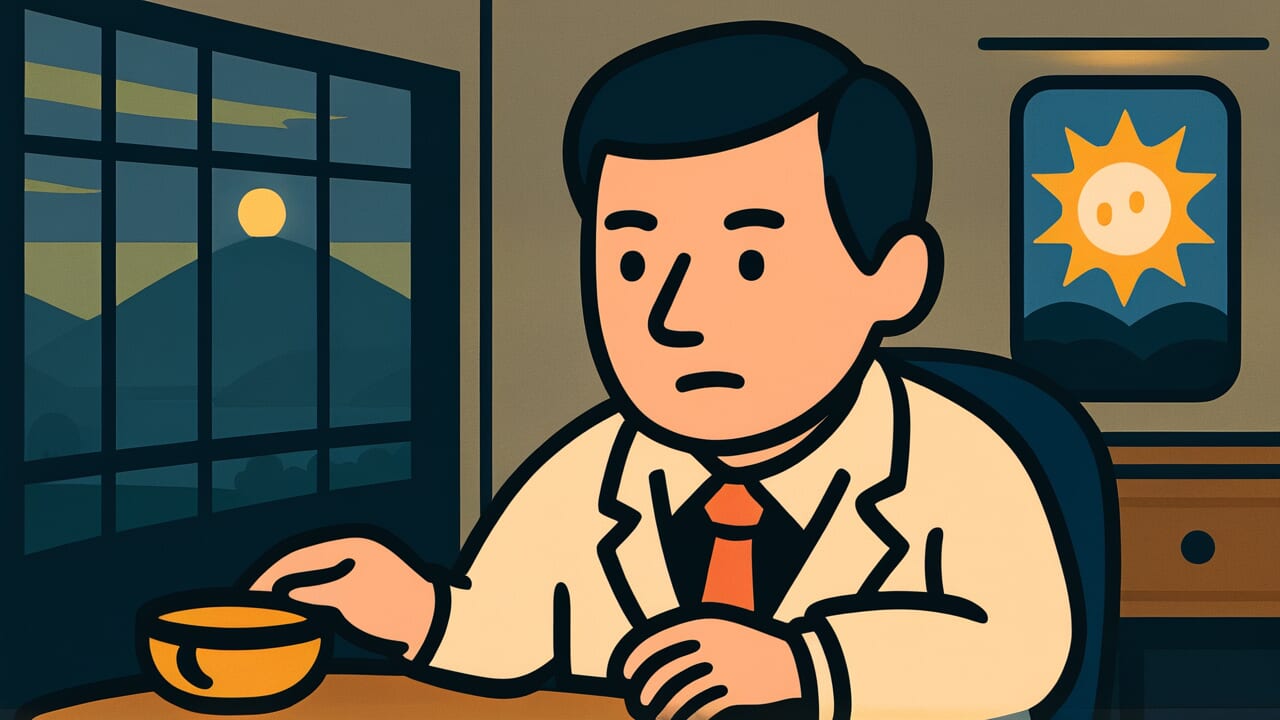How to Read “In the morning, don’t plan for the evening”
Ashita ni yūbe wo hakarazu
Meaning of “In the morning, don’t plan for the evening”
“In the morning, don’t plan for the evening” means you shouldn’t make long-term plans because the future is unpredictable. Life is so uncertain that you can’t even plan for the evening when it’s still morning.
This proverb teaches us that clinging to distant future plans is pointless. We naturally worry about what’s ahead and want to make detailed plans. But the truth is, we don’t even know what will happen tomorrow.
Illness, accidents, natural disasters, or unexpected good fortune can overturn our plans at any moment.
Today, people might see this as “lacking planning skills” in a negative way. But originally, this proverb warned against excessive attachment to the future. It teaches the importance of living fully in this moment.
Rather than letting an uncertain future steal your attention, you should focus on the “now” that definitely exists. This proverb contains a life philosophy about what truly matters.
Origin and Etymology
The exact source of this proverb has several theories. Most scholars believe it was influenced by ancient Chinese philosophy, especially Taoist thought. The method of contrasting “morning” and “evening” to express life’s impermanence appears in ancient Chinese texts.
The word “hakarazu” means “don’t plan” or “don’t scheme.” So “In the morning, don’t plan for the evening” literally means you can’t even plan for the evening when it’s still morning.
This doesn’t just show how short the time is. It suggests the limits of human ability to predict the future.
This expression appears in Japanese texts from the Edo period. This means people were using it at least by that time. People back then constantly faced unpredictable events like natural disasters, famines, and diseases.
Medicine wasn’t advanced, and even tomorrow’s survival wasn’t guaranteed. For people living in such an uncertain world, this proverb wasn’t just a lesson. It was their daily reality.
The structure of the phrase itself captures the universal themes of life’s fragility and uncertainty. That’s why it has been passed down through the ages.
Usage Examples
- In this recession, it’s “in the morning, don’t plan for the evening” – I can’t make plans for next year
- Health is “in the morning, don’t plan for the evening,” so let’s do today what we can do today
Universal Wisdom
The proverb “In the morning, don’t plan for the evening” captures a fundamental anxiety humans have carried since ancient times. It’s the truth that “the future can never be grasped.”
We humans are creatures who try to predict and control the future. This is part of our survival instinct. But at the same time, humanity has learned from experience that tomorrow isn’t always an extension of today.
A loved one suddenly disappears. A healthy body falls to disease. A stable life crumbles in an instant. These experiences are realities that all humans have faced across time and cultures.
This proverb has been passed down for so long because it captures an essential condition of human existence. We are thrown into this world as beings who cannot know the future.
That uncertainty makes life anxious, but it also fills it with possibility.
Our ancestors didn’t teach us to lament this uncertainty, but to accept it. Don’t become so attached to the future that you lose sight of the “now” that definitely exists.
This wisdom will hold value forever, as long as humans remain human.
When AI Hears This
Even in just half a day from morning to evening, countless events occur in the world. Consider just the movement of molecules in the air. More than 10 to the 23rd power collisions happen every second.
No matter how detailed your understanding of the morning situation, the information needed to perfectly predict the evening state grows exponentially over time.
Claude Shannon, founder of information theory, showed how to quantify uncertainty. Even if you have 100 bits of information in the morning, you need 200 bits by noon and 400 bits by evening.
The information required for prediction doubles and doubles. This has the same structure as entropy increase shown by the second law of thermodynamics.
Just as milk dropped in a coffee cup never returns to its original state, time’s arrow moves in only one direction. Information shortage always expands.
What’s interesting is that this information shortage isn’t just a lack of knowledge. It’s a fundamental limit imposed by physical laws. Even the most powerful computer cannot calculate everything about evening using only morning information.
This is impossible in principle. Weather forecasts only work a few days ahead for the same reason.
This proverb expresses the deep relationship between time and information that humans understood through experience. It does so with surprising accuracy.
Lessons for Today
This proverb teaches modern people the importance of becoming free from attachment to the future. We’ve been taught that making plans, setting goals, and preparing for the future are virtues.
Of course, these aren’t bad things in themselves. But when we become too caught up in the future, we lose sight of the richness of this moment.
Modern society overflows with information that stirs up “anxiety about the future.” Retirement funds, career plans, health management. These are all important things. But are we so absorbed by them that we forget to live today?
This proverb encourages us to accept the reality that perfect plans don’t exist. It recommends a way of life that responds flexibly to change.
Precisely because we don’t know what will happen tomorrow, we should pour all our energy into what we can do today. Cherish the people we can meet today. Savor the joy we can feel today.
This accumulation of “now” moments is what creates a fulfilling life in the end.
Uncertainty isn’t something to fear. It’s the very possibility that enriches life. Don’t be bound by plans. Have the courage to live in the now.



Comments